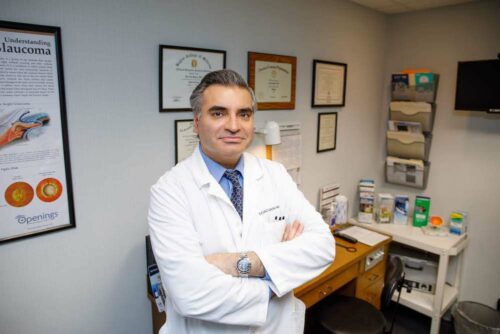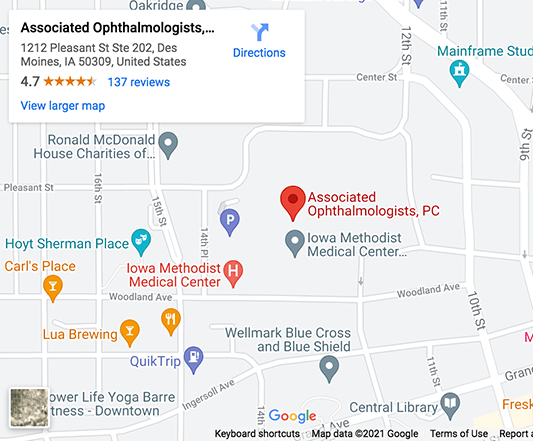
What other options are available for correcting refractive errors?
By far, the most common method is eyeglasses. Another popular option is contact lenses, either soft or rigid gas permeable. Common problems with contact lenses include irritation, daily inconvenience, and the ongoing cost of lens replacement and contact lens solutions.
Is laser eye surgery painful?
The LASIK procedure is associated with a sensation of pressure during certain steps of the surgery, but the patient rarely describes it as painful. There may be mild to moderate discomfort following LASIK, but most patients find that their eyes are quite comfortable following this procedure. The advanced surface ablation (ASA) procedure usually causes no discomfort during the procedure. However, the discomfort occurs during the first one to two days following the surgery. A soft contact lens is placed on the eye at the end of surgery, and this acts like a bandage to help minimize discomfort. Most individuals have minimal discomfort.
How do I decide between undergoing ASA and LASIK?
The results of both procedures are comparable for low to moderate amounts of near-sightedness, far-sightedness, and astigmatism. The advantages of LASIK are that vision often recovers within just one or two days and there is usually only minimal or no discomfort after the procedure. LASIK does introduce the small additional risk of making a flap, although problems with this fortunately are very rare. The advantage of ASA is that there is no flap, so no chance of flap complications, but the recovery of vision takes a little longer. We will be glad to discuss these options with you and make our recommendation, according to your particular situation.
What if I move my eye during the laser treatment?
While the treatment is being performed, you are required to look at a red blinking light located on the inside of the laser. It is important that you look steadily at the light throughout the operation, since this keeps the eye centered for the laser. However, if you temporarily look away or lose the ability to look at the fixation light, do not be concerned. The laser uses the most advanced 3D active tracking technology and will stop the treatment if the eye is not perfectly centered and resumes treatment once your eyes are re-centered.
Can I have both eyes treated at the same time?
We have successfully performed bilateral sequential LASIK and advanced surface ablation (ASA) procedures in thousands of patients. Most patients prefer this to waiting between eyes. Nowadays, most doctors usually perform surgery on both eyes on the same day.
Is laser vision correction permanent?
Laser vision correction has been performed since 1995. Presently, the procedure appears to be permanent with regard to distance vision correction. However, the main change that occurs during aging is associated with reading vision. This will be discussed during the consultation process if it applies to you and your specific refractive error and age.
How long does the procedure take?
The average length of time at the surgery center is about 1½ hours. The procedure takes approximately 10 minutes. The actual exposure to the laser is less than a minute per eye.
When can I resume my normal activities following laser surgery?
Following LASIK, one can usually drive within a day or two and return to full activity by 2 or 3 days. Following Advanced Surface Ablation (ASA), most individuals find that they can return to work and drive in 4-5 days. Full activity can begin within 4-5 days, but patients are asked not to go swimming or use hot tubs for three weeks following either procedure.
How often do I need to be seen after the procedure?
Typically, patients will need to be seen the day after the procedure followed by visits at one week, and another visit at four to eight weeks. We highly recommend that patients be available for follow-up during the first 7-10 days after surgery.
When does my vision recover following laser refractive surgery?
Following LASIK, vision is quite satisfactory in one or two days following the operation. Vision then improves over the next week (although in some cases, vision may further improve over the next few months), assuming that no additional correction is needed. Following ASA, vision is typically blurry for the first 3-4 days. Some patients experience excellent vision as early as one week, whereas for others, the full recovery may take a few weeks. In some cases, with high corrections, vision can take a few months to improve but throughout this time you are fully functional.
Can laser refractive surgery cause me to lose vision?
As with any operation, Advanced Surface Ablation and LASIK are not risk-free. In U.S. studies of laser vision correction using the excimer laser, serious complications or problems occurred in less than 1% of the patients. These complications included loss of vision even with glasses, over and under correction, and visually significant corneal haze.
What is iDesign wavefront technology?
This is an individualized laser vision correction procedure that is iDesign-driven. This advanced wavefront technology enables us to measure and correct imperfections that are unique to each individual’s vision that could not have been measured before with standard equipment. iDesign helps us to create a tailor-made correction for your eyes.
Will LASIK or ASA eliminate my need for reading glasses?
Neither procedure changes the gradual loss of focusing power that occurs as we get older. If one’s near-sightedness in both eyes is nearly or fully corrected with LASIK or ASA, then reading glasses will be required at around age 40-45 — as with all others, regardless of whether they have undergone surgery.
One approach that is successful in some patients is called monovision, in which eye is deliberately left with a modest amount of near-sightedness, permitting this eye to serve as the reading eye. In many patients, this can reduce or eliminate the need for reading glasses until the mid-50s.
The compromise, of course, is that the eye that is left with some near-sightedness does not see as well at distance. This could slightly decrease depth perception and is not recommended for individuals with special needs, such as pilots.
What, if any, side effects will I notice after LASIK laser vision correction?
Most everyone will experience some glare and halos in the immediate postoperative period. Your eyes will also feel dry after the procedure, but this can be relieved by the use of preservative-free artificial tears. It is rare that these side effects persist longer than 2-6 weeks. Some patients may not achieve their expected uncorrected visual outcome. If this is related to an under-correction or over-correction, you may be a candidate for an enhancement of the original surgical procedure.
Why do so many patients choose to have their eyes corrected by Dr. Husain?
Dr. Husain has performed thousands of successful refractive procedures. He personally takes care of each patient, pre- and post-operatively. He does not delegate this responsibility to anybody else. Please do not be misled by inaccurate, deceptive and overly sensational advertising that is commonly seen in the newspapers and the media. Your goal is to find an experienced, ethical and an established surgeon who will provide an honest assessment about your likely outcomes, risks and benefits, and personalized quality care after your surgery.
When it comes to correcting your eyes, there should be no compromise. We are dedicated to providing the highest standard of care to our patients with attention to the finest detail. Our reputable and well-established practice enjoys among the highest satisfaction rates in the field. Our rate of enhancement (touch-ups) is also among the lowest in the field. Every aspect of our practice including our laser and examination equipment is state-of-the-art. Most of all, we truly care for our patients!
If you have any further questions, please feel free to write them down and ask us on the day of your consultation or call us at 515-244-EYES. We believe that an educated patient knows what to expect and will find the procedure less intimidating. It is our goal to make you as comfortable as possible and alleviate any of your fears.
Laser vision correction checklist
- Will the surgeon personally do my screening? Who would you want telling you if you are a candidate for laser eye surgery? A surgeon, a non-surgeon, or a salesperson?
- Will the surgeon be available to answer all of my questions and address my concerns?
- Will I personally see my surgeon for all my pre- and post-operative care?
- Is the facility that will do my laser vision correction using state-of-the-art equipment?
- Is the facility employing deceptive, inaccurate or overly sensational advertising? (If it sounds too good to be true, be very cautious!)
- Will state-of-the-art FDA-approved technology be used for my surgery?
- Has the technology that will be used on my eyes been tried and tested exhaustively on millions of patients worldwide, or am I a guinea pig for a new technology?
- What is my surgeon’s complication rate?
- What is my surgeon’s enhancement/ retreatment rate?
- Has my surgeon treated thousands of patients successfully?
- Has my surgeon completed an accredited fellowship in refractive surgery?
- Is the practice pushing technology over quality of outcomes?
- Do I feel rushed and under pressure to commit to surgery during my initial consultation?
- Does my surgeon inform me that laser vision correction does not provide perfect vision, but rather will make me much more functional with decreased dependence on glasses and contact lenses?
- Does my surgeon show concern about my well-being rather than treating me like a number?





